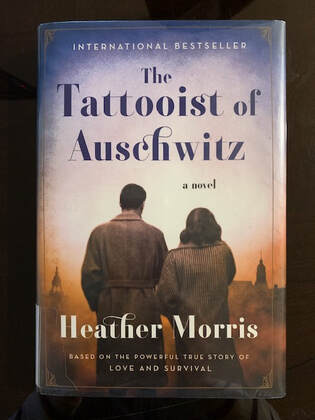The Tattooist of Auschwitz by Heather Morris .The Tattooist of Auschwitz by Heather Morris is based on Lale Ludwig Eisenberg’s life story after being transported to Auschwitz on April 13, 1942. Auschwitz, the largest death camp operated by the Nazis during World War II. Over 1 million innocent men, women and children were put to death. This powerful book was written by Heather Morris of New Zealand after meeting with Lale Sokolov, while she worked in a public hospital in Melbourne. Lale was finally ready to tell his story before he died and reunited with this beloved Gita who died three years before. People sent to Auschwitz were first divided into two groups: the people in the first group were deemed to weak, too young (most children), or too sick to work. They were immediately sent to the showers, which were actually gas chambers made to look like shower rooms. The second group were made up of those deemed strong enough to work. Those were the prisoners who got numbers tattooed on their arms. The numbers were meant to dehumanize the prisoners- they would no longer be known by their names, simply their numbers. If you were in this group, you had some chance of survival. A number didn't mean you would survive, but you might. Numbers were given to only one group of prisoners- those who were deemed healthy and strong enough to work. Lale, as many Jews and people brought to concentration camps were put to work. He was assigned to work as the tattooist. His job was to permanently tattooed the identification numbers on the newly arrived prisoners deemed able to work to Auschwitz and Birkenau. He meets Gita when he must re-tattoo her arm. He falls in love with her and vows they will survive and one day walk out of here and marry. This book is an important reminder for the world to remember those who were murdered, tortured and dehumanized and bore witness to the atrocities of the Holocaust and the strength of love and the power of resilience to overcome and survive. January 27, 2020 marks the 75th Anniversary of the Liberation of Auschwitz/Birkenau. In the words of a survivor: "It is important for everyone to remember what happened at Auschwitz-Birkenau because the number of survivors who can give their testimonies is dwindling, and such evil must never happen again," he added. Mike Bornstein from Żarki was deported to Auschwitz in July 1944. He was in the camp until the day of liberation on January 27, 1945. "I spent most of my life trying to forget Auschwitz and all the reasons I have a tattoo on my arm. I like to focus on happier things -- I am blessed with a wonderful life now. But I was one of the youngest survivors, and that makes me one of the last survivors here now. I feel an obligation to be at the 75th anniversary, to stand up and say, 'I was there. I survived. We can't forget what happened at Auschwitz.' I also want to send a message. I think it's important to show the strength of the Jewish people and the power of optimism. I'll be standing in Auschwitz with one of my twelve grandkids. My life is good," he said.
0 Comments
Leave a Reply. |

Kathy Corey
I'm an expert amateur or maybe an amateur expert. Archives
May 2021
Categories
All
|
 RSS Feed
RSS Feed
